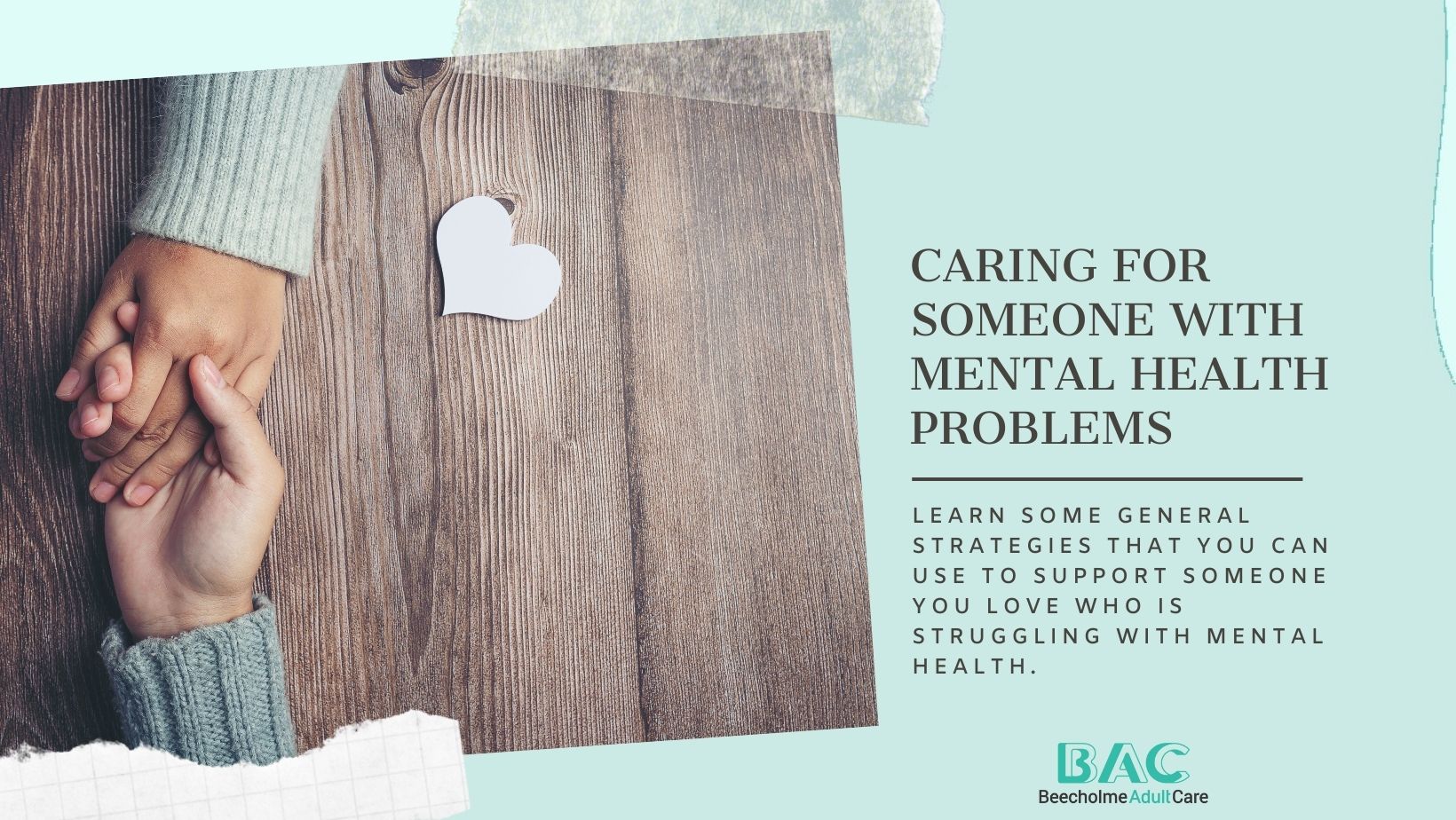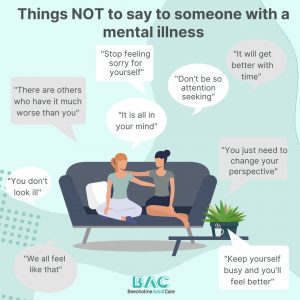Caring for someone with mental health problems
Anyone can experience mental health problems. Friends and family can make all the difference in a person’s recovery process.
It can be very difficult and heart-wrenching to see a loved one struggling with symptoms of mental illness. And often it can be hard to know how to best help and support your loved one.
Every individual is different and situations vary greatly. The person may have a specific diagnosis, or you may just have concerns about the way a person has been talking and behaving.
How do I know if someone needs support?
It’s not always easy to tell if someone has a mental illness. Sometimes it will seem obvious when someone is going through a hard time, but there is no simple way of knowing if they have a mental health problem.
Certain symptoms are common with specific mental health problems, no two people behave in exactly the same way when they are unwell. If you know the person well, you may notice changes in their behaviour or mood.
The signs someone may have a mental illness can include:
– they are anxious or worried
– they are depressed or unhappy
– they have emotional outbursts
– they have sleep problems
– they have weight or appetite changes
– they are quiet or withdrawn
– they are misusing substances like alcohol or drugs
– they feel guilty or worthless
– you notice changes in their behaviour
If someone is showing these signs, it’s important to raise your concerns with them, even though they might deny the problem and be reluctant or refuse to get help. They may react with anger, shame or embarrassment.
Try not to feel guilty if you didn’t know your friend or someone you love has a mental health issue — the changes can be gradual, and people often hide their symptoms from close friends and family. They may not be ready for treatment straight away. Taking it slowly and figuring it out together is a good way to steer them toward the road to recovery.
How can I help someone with mental health problems?
There are a number of ways you can help a friend, relative or colleague who has a mental health problem:
Express concern and say you can help
Letting someone know you’re worried is a good way to open up a conversation – it shows you care about the person, have time for them and that they do not have to avoid things with you.
Act as you usually do together
Do what you usually do – behaving differently can make someone feel more isolated. Do not be afraid to offer kind words and a space to talk, whether by phone, messaging or in person.
Reassure them
The first time someone mentions their worries is a big step. It’s good to recognise this and reassure them. Let them know you’re there to listen when they need to talk.
Offer your time to listen
Listening is an important skill. Ask open questions that start with “how”, “what”, “where” or “when”. This can help people open up.
Be patient
You will not always know the full story. There may be reasons why they have found it difficult to ask for help. Just being there can be helpful for someone who may want to open up later.
If they do not want support
Gently explore their reasons for not wanting to get support. If they are unsure whether to get help, just talking and listening without judgement could help work out what’s getting in the way.
Do not force it
Do not force someone to talk to you or get help, and do not go to a doctor on their behalf. This may lead to them feeling uncomfortable, with less power and less able to speak for themselves.
Look after yourself
It can be upsetting to hear someone you care about in distress. Be kind to yourself and take some time to relax or do something you enjoy.
Offer practical help
Little acts of kindness – like offering to do the shopping or to go to professional appointments with them – can help. Find out what works for them.
How to talk about mental health
If you are worried about someone it can be difficult to know what to do. When you are aware there is an issue, it is important not to wait. Waiting and hoping they will come to you for help might loose valuable time in getting them support.
Talking to someone is often the first step to take when you know they are going through a hard time. This way you can find out what is troubling them and what you can do to help.
Do you need help starting a conversation about mental health? Try leading with these questions and make sure to actively listen to your friend or family member’s response.
– I’ve been worried about you. Can we talk about what you are experiencing? If not, who are you comfortable talking to?
– What can I do to help you to talk about issues with your parents or someone else who is responsible and cares about you?
– What else can I help you with?
– I am someone who cares and wants to listen. What do you want me to know about how you are feeling?
– Who or what has helped you deal with similar issues in the past?
– Sometimes talking to someone who has dealt with a similar experience helps. Do you know of others who have experienced these types of problems who you can talk with?
– It seems like you are going through a difficult time. How can I help you to find help?
– How can I help you find more information about mental health problems?
– I’m concerned about your safety. Have you thought about harming yourself or others?
When talking about mental health problems:
– Communicate in a straightforward manner
– Speak at a level appropriate to a person’s age and development level (preschool children need fewer details as compared to teenagers)
– Discuss the topic when and where the person feels safe and comfortable
– Watch for reactions during the discussion and slow down or back up if the person becomes confused or looks upset
How do I respond in a crisis?
People with mental health problems sometimes experience a crisis, such as feeling suicidal, or experiencing their own or a different reality.
You may feel a sense of crisis too, but it’s important to stay calm yourself.
There are some general strategies that you can use to help:
– Listen without making judgements and concentrate on their needs at that moment.
– Ask them what would help them.
– Reassure and signpost practical information or resources.
– Avoid confrontation.
– Ask if there is someone they would like you to contact.
– Encourage them to seek appropriate professional help.
– If they have hurt themselves, make sure they get the first aid they need.
Seeing, hearing or believing things that no-one else does can be the symptom of a mental health problem. It can be frightening and upsetting. Gently remind the person who you are and why you are there. Don’t reinforce or dismiss their experiences, but acknowledge how the symptoms are making them feel.
Get help for a loved one
If you think your friend or family member is in need of professional mental health support, don’t wait and get in contact with one of BAC qualified therapists.


